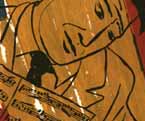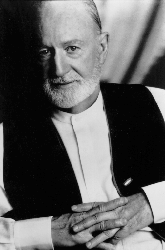
|
|
 [
AJHF |
About |
Home |
News |
Dates |
Artists |
Archive
]
[
AJHF |
About |
Home |
News |
Dates |
Artists |
Archive
]
[ Facebook | Hall of Fame | Downloads | Board | Links | Donations | Memberships ]
Archive
Press Release
March 2, 1998
 Mose Allison
Mose Allison
Monday Jazz at the Afterthought
Two shows: April 27th at 8 p.m. and 10 p.m.
Ticket prices: TBA
2721 Kavanugh, Little Rock (501) 663-1196
From January 1998 Blue Note biography:
Mose John Allison, Jr. was born on November 11, 1927 in Tippo, Mississippi. The first name on his birth certificate is Mose, a fact he makes perfectly clear on "MJA, Jr.," the lead track of Gimcracks and Gewgaws, his new Blue Note album.
"That's the only name I've ever had," he sings in his trademark Delta drawl. "Don't call me Moses, don't call me Moe/You're just gonna make my momma mad."
While some people may be confused by his name--"I checked into a hotel recently, and they had my reservation under 'Allison Mose,"' the Long Island-based musician says--anyone who's followed jazz or pop over the past 40 years should be familiar with Mose Allison's unique musical style--a profoundly personal, frequently humor-laced fusion of swing, bop, blues and classical elements that is as American as his name. His influences are wildly diverse and include Nat Cole, Bud Powell, A1 Haig, Thelonious Monk, John Lewis, Percy Mayfield, Charles Brown, Charles Ives and Bela Bartok. As a singer, pianist, and songwriter, Allison's influence on others also has been wide-ranging; among those who 've been deeply affected by his music are Georgie Fame, John Mayall, Van Morrison, Randy Newman, Pete Townsend and Ben Sidran.
Sidran, a noted broadcaster, author and recording artist, also happens to be the producer of Gimcracks and Gewgaws, as well as of Mose's three previous Blue Note discs (1987's Ever Since the World Ended, 1990's My Backyard and 1994's The Earth Wants You) and of 1996's Tell Me Something, a Verve album featuring 13 Mose Allison compositions performed by Morrison, Fame and Sidran, with Mose himself joining Morrison on two selections. "We've been buddies for a long time, so we understand each other," Mose says of Sidran. "We get together on players and what songs we'll do at a date. I let him do all the technical stuff."
Allison used two New York compatriots--bassist Ratzo Harris and drummer Paul Motian--for Gimcracks and Gewgaws. Harris has been gigging with Allison for around a dozen years, while Motian's association with Allison goes back much further. "I've been knowing him since '56 or '57," Allison says. "We played together with Al [Cohn] and Zoot [Sims] and with Stan Getz, and he also played some of my early trio gigs." Motian, renowned for his work with the late Bill Evans and with his own all-star combos, is well-versed in the rhythmic demands Allison makes of his drummers, one of several characteristics that sets Allison's music apart from that of other artists. "I tell drummers not to play the backbeat, and I tell 'em not to play the sock cymbal on two and four, which most jazz drummers do," Allison explains. "The real heavy backbeat is just a commercial thing that got brought into jazz music and blues music, and it's the foundation of rock music. But if you look at the place where the music came from, like in African and Afro-Cuban music, you won't find any backbeat. It's a flowing type thing, and that's what I'm after. You get more freedom that way."
Sidran picked guitarist Russell Malone and tenor saxophonist Mark Shim for the album.
Among other notable contributions, Malone (a former Harry Connick, Jr. and current Diana Krall sideman) plays a decidedly down-home solo on "St. Louis Blues," one of only two non-Allison originals on the disc. Shim, a newcomer whose previous credits include work with Betty Carter, caught Allison off guard. "I'd never heard of him," Allison says.
"He looks like he's about 15, but he's actually 23. He knocked everybody out, 'cause he's got a great sound and all the flexibility and everything." (Shim's debut album, Mind Over Matter, is being issued by Blue Note at the same time as Gimcracks and Gewgaws).
Gimcracks and gewgaws are not mentioned in the title tune, although their definitions are given on the CD's front inlay. "The reason I call that tune 'Gimcracks and Gewgaws' is because it's just a bunch of verses I threw together," the composer explains. "A lot of those verses were inspired by the little five-note flexibility exercises I do when I'm home and feel like my hands are getting stiff. Those things are recurring patterns that began to suggest lyrics to me."
"Numbers on Paper" is a slow waltz with a melody that's based on a Hungarian folksong that occurs in the music of two of Allison's favorite composers, Bartok and Kodaly.
"Cruise Control," Allison explains, "is a metaphor for being in a place in your life where things are going well." Of "Mockingbird," he says, "Any musician who's ever heard a mockingbird when it's really wailin' is just awestruck by the variety and the purity of the notes and the patterns." Allison offers comments on contemporary consumer-oriented society in "The More You Get," and "Texanna" is about his paternal grandmother, whom he never knew nor knew much about. "What Will It Be" is a sardonic take on death, while "Somebody Gonna Have to Move" is another in Allison's series of don't-tread-on-me odes. "Fires of Spring" contains his musings on the "cosmological thing--the galactic swirl and all that"--and "What's With You" is an updated rendition of one of his classic put-down tunes.
The most unusual track on Gimcracks and Gewgaws is the last--"Old Man Blues." Only a minute and a half in length, it finds Allison performing unaccompanied, something he rarely does in person or in the recording studio. Although not without a dash of wit, the song contrasts the treatment of old men in the USA and in the Orient. It also serves as something of a follow-up to "Blues (A Young Man)," a number from Allison's very first album, recorded for Prestige in 1957, that was popularized by the Who in 1970 as "Young Man Blues."
"Forty years later," Allison says, "I figured it was time for the sequel."
[Articles | Obituaries | Press Releases | Research | Schedules | NAJS]
Arkansas Jazz Heritage Foundation · PO Box 251187 · Little Rock, AR 72225-1187 US · info@arjazz.org
Copyright © Arkansas Jazz Heritage Foundation. All rights reserved.
Information on AJHF and Jazz:
Comments on web site:
About this site. We appreciate those who have helped create this site.
URL: https://www.arjazz.org